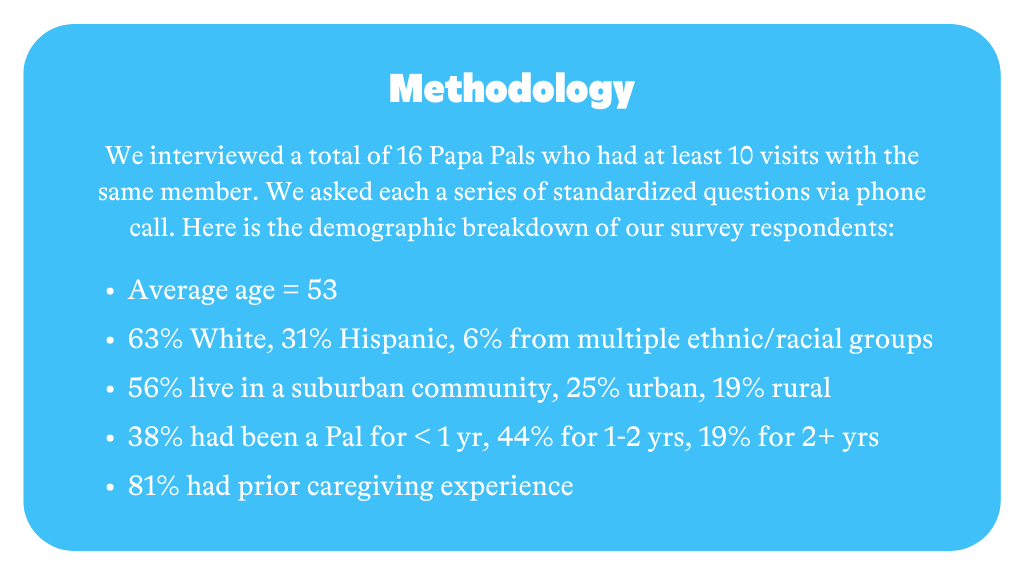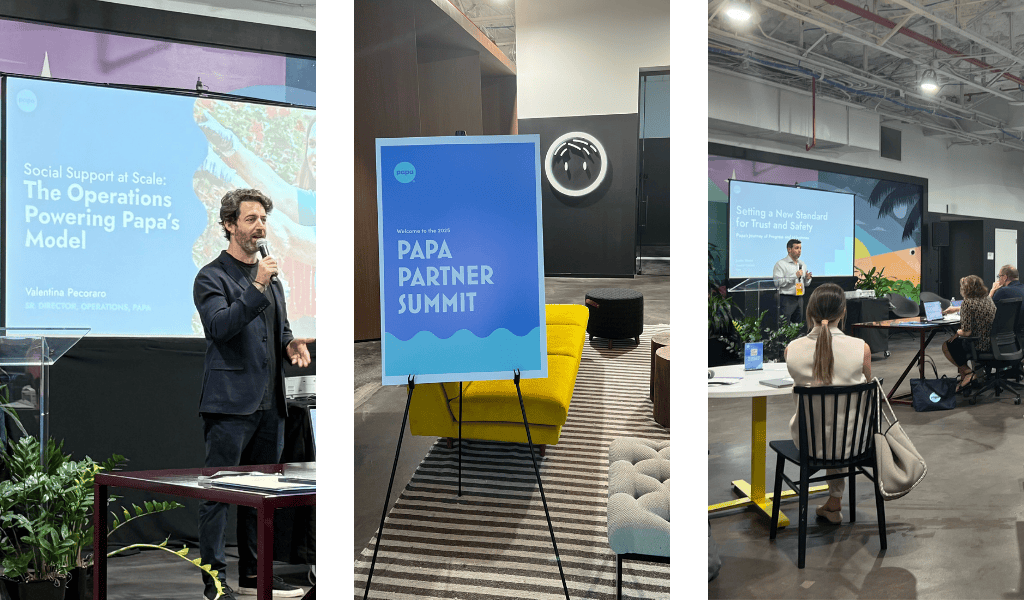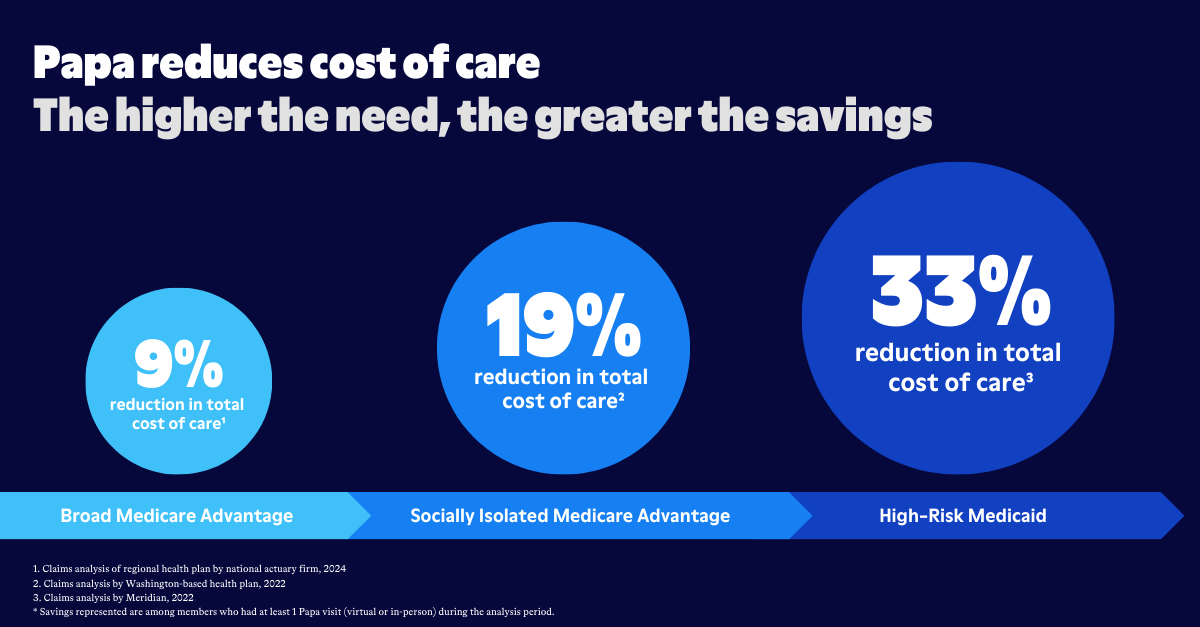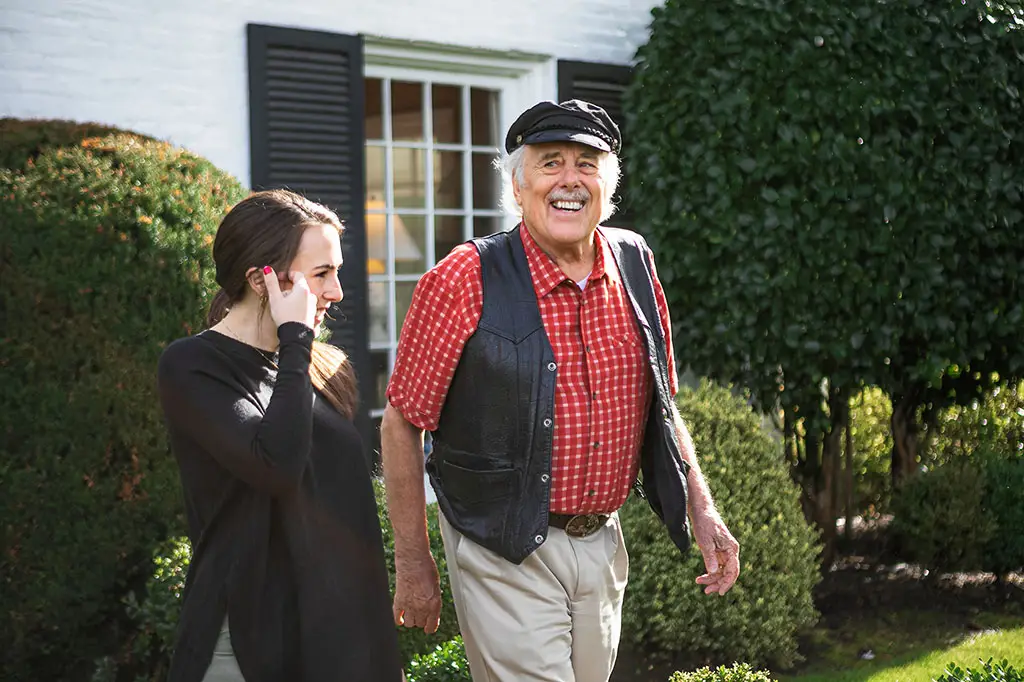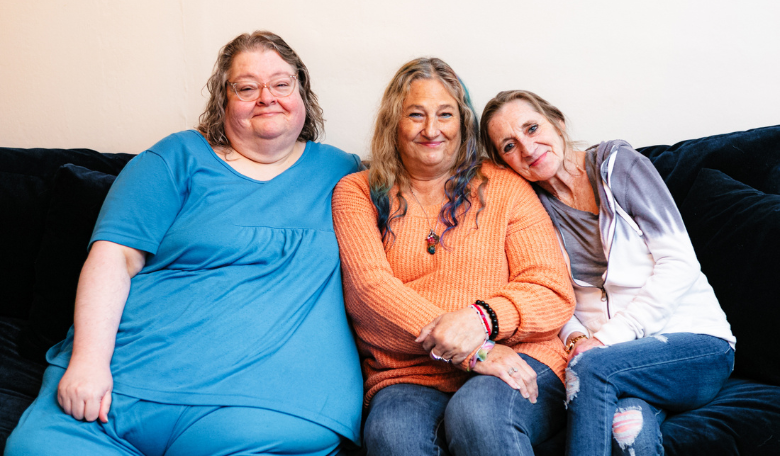
At Papa, we envision a world where no one has to go it alone. Central to achieving this vision are everyday people, who have an impact that goes well beyond the ordinary.
We each hold the power to transform how we provide care in this country. That’s a good reason to have hope for the future of health care.
Consider these statistics. By 2040, the number of Americans aged 60+ will have doubled from 2020. By 2030, there’s expected to be a 168% increase in the number of Americans with three or more chronic conditions, compared to just 15 years earlier. And if we stay on our current trajectory, we’ll have a national shortage of 355,000 caregivers by 2040.
How can we fill the caregiver gap as the number of individuals who need help grows?
To address these important societal issues, we must disrupt the status quo. We don’t just need more doctors and nurses—we also need more people who care and are willing to lend a helping hand. Then we need to lift those people up so they can lift up others.
For us, and many around the country, those people are our Papa Pals.
Papa Pal Perspective
Papa Pals are caring, mission-minded individuals who want to make a difference in their communities. They bring personalized social support and companionship to older adults and families when and where they need it, providing care that is non-medical in nature, but promotes health—transportation, technology assistance, light housework, caregiving support, and, of course, social interaction.
Papa Pals have a consistent, attentive presence in members’ lives and build trusted relationships over time. Through this trust, they’re able to uncover what each member truly needs in order to be well.
The insights we garner from our Papa Pals are invaluable as we seek to care for our members in the ways they want and need. Very few people get to know our members the way their Papa Pals do—not even their own families or doctors.

We learn from our Papa Pals so we can continue to improve how we serve our members well in this changing world. This knowledge-gathering takes several forms, including regular focus groups, one-on-one interviews, Net Promoter Score (NPS) surveys, concept testing, and more.
Recently, we spoke to 16 highly-engaged Papa Pals about their impact on their regular members—and how, in turn, that relationship affects them. This group includes one Papa Pal who has completed more than 1,000 visits and others who have seen the same member more than 50 and 100 times.
While a broader survey is forthcoming, our findings so far are compelling. They demonstrate:
- The important role of a friend in supporting a person’s whole health
- The bi-directional impact of that friendship on each participant’s health and well-being
- The sweeping effect companionship has—improving Papa Pals’ own relationships with family, friends, and broader communities

In reviewing these results, we see clearly how our vision of transformational health care becomes reality.
Impact on Papa Pals
There is a widening gap in our healthcare system that’s leaving people behind, yet there are so many who can help. Through our technology and marketplace-type model, we’ve unlocked a new workforce of empathetic, mission-driven individuals to fill this widening gap.

Our Papa Pals do this work because they want to help others in their community—and do so on their own schedule. Many have experience caring for aging or sick loved ones in their own lives, and nearly all are searching for more mission-driven work.
In addition to their hearts for service, and their experience in caregiving, 31% of Papa Pals reported that they live alone. What this tells us is how important the social connection is—not just to our members but also to our Papa Pals.
Our Pals have found passion, purpose—and companionship—through Papa. They’re our heroes. They not only change others’ lives, but are deeply impacted themselves. The evidence from our survey is decisive in this area.
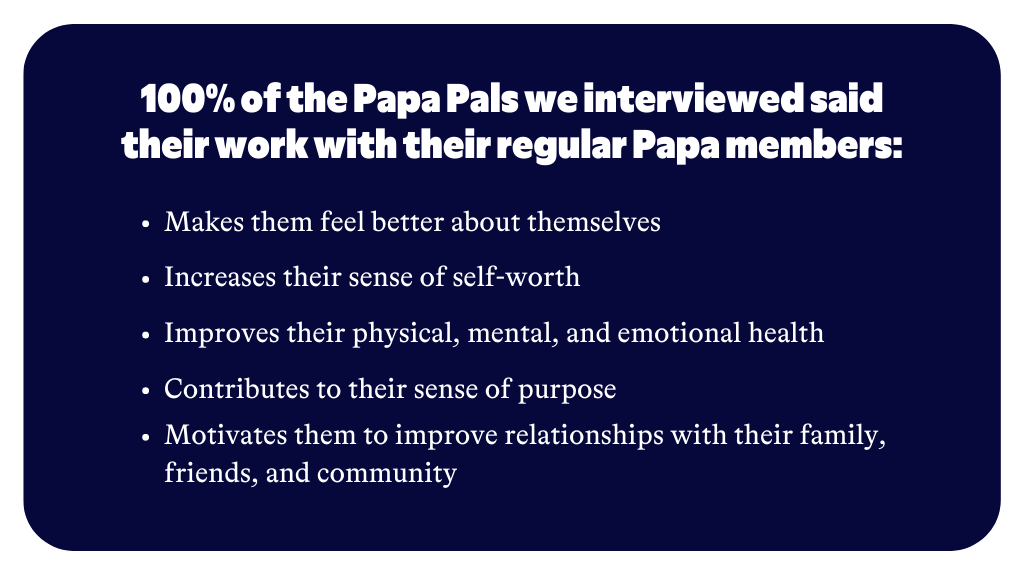
When considering that Papa Pals have conducted more than 1.5 million visits to date, it’s easy to realize just how broad of a ripple effect companionship and social support can have.


Impact on members
We also sought to understand what our Papa Pals see most in the home and the incredible insights they uncover, which enable them, Papa’s social care navigators, and our members’ health plans to close gaps and improve overall health and well-being.
The U.S. Surgeon General recently issued a national advisory about the epidemic of loneliness and social isolation our country faces. As society becomes increasingly individualistic—a shift that impacts the health and well-being of our communities—it’s not surprising that support for emotional well-being topped the list of member needs. It ranked higher than help accessing transportation and food, visiting family and friends, accessing doctors, and more.

Since Papa Pals spend one-on-one time with members in their homes, they’re able to notice things that may have otherwise been missed. When asked how well Papa Pals understand their members’ whole health needs—the physical, emotional, and social needs that must be addressed—every Papa Pal responded 3 or higher (on a scale of 1-5, where 5 is highest understanding of members’ needs), meaning they believe they have a good understanding of their members’ needs.

Understanding a person’s whole health requires trust, and a relationship. Building something as important as trust doesn’t happen immediately. Papa Pals reported that it takes, on average, 4-5 hours for members to let their guard down and share something personal. That’s when the magic occurs. As more than 50% of our visits (and growing) are between members and their “preferred Pals”—they get to know one another like friends and notice changes over time. These trusted relationships also enable us to help members outside the confines of a traditional healthcare system—using information that otherwise could fall through the cracks.
In contrast, today’s traditional healthcare providers struggle to understand their patients’ whole health–they see them for short visits every few months or once a year.
One Papa Pal told us that they were able to encourage a member, who seemed really defeated by pain, to go see a doctor. Unfortunately, it turned out that he had stage 4 prostate cancer. His Papa Pal was so saddened by the news, but was able to help the member get the comfort and care he needed in the final days of his life.
100% of the Papa Pals we interviewed said the members they frequently meet with “often” or “always” share personal information with them.

Papa Pals shared what they know about their members that doctors might not, and the responses were eye-opening. Several Pals mentioned issues related to medication—either expired or disorganized prescriptions or members not taking their medicine as prescribed. One Pal identified two prescriptions that should not be taken together, and worked with the member to contact their pharmacy and/or doctor to resolve it.
Pals also mentioned their older members aren’t getting enough social interaction. They’re nervous and fearful to leave home on the heels of the pandemic, and likely aren’t getting enough exposure to other people or the outdoors.

Papa Pals also cited issues such as:
- Food and transportation insecurity
- Nutrition concerns
- Mental health issues
- Poor living conditions
- Difficult family relations
There’s a clear picture about members’ well-being that Papa Pals can piece together over time, given their strong relationships. And when they identify unmet needs, we’re able to help members navigate their unmet needs and concerns through our social care navigators and health plan resources.
The result is powerful: less loneliness, fewer trips to the emergency room, a brighter outlook, and better physical health.
Conclusion
Papa Pals, and caregivers in general, give and receive so much value. They give of themselves so that their members don’t have to go it alone, and then they realize that they don’t have to go it alone either. It’s really this beautiful cycle that keeps going—and giving.

The survey shows us what we at Papa already inherently knew—that people need people in order to experience whole health. We need each other. Period. It’s time to recognize what has been right in front of us, and use our shared human experience to change what health care can look like.
This is why we believe that human connection should be seen as medicine, just as important as prescriptions for life-saving drugs. Companions are another form of first responders.
At Papa, we have a big and expansive vision for the future of whole health, and community is how we’ll make it happen.
